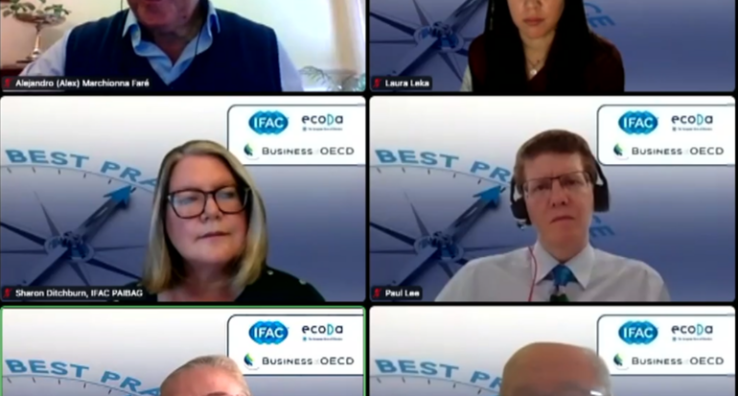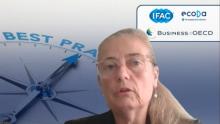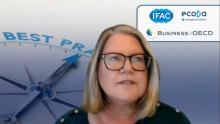On September 20, 2023, experts from the OECD and the business, board director, investor and accountancy communities came together to discuss what companies can do to promote sustainability and investor confidence. Their meeting was in the light of the new “Sustainability and Resilience” Chapter of the Revised G20/OECD Corporate Governance Principles at a joint IFAC, ecoDa and Business at OECD (BIAC) global webinar.
The revised G20/OECD Principles of Corporate Governance were given a final endorsement by leaders at the G20 Summit in September 2023. The revised Principles and their complementary publication, the 2023 Factbook, take account of global evolutions in corporate governance and capital markets. They also reflect shifts in stakeholder expectations, including in response to climate change. For the first time, the Principles include recommendations on sustainability.
BIAC, ecoDa and IFAC participated in all the phases of the Principles’ review. In order to raise awareness on the revised Principles, the three organizations jointly organized a lively discussion, which attracted over 300 live attendees across more than 150 jurisdictions. With a panel of global experts in corporate governance, the event explored the main features of the revised Principles, with a focus on the new chapter, “Sustainability and Resilience.”
A Pivotal Moment for Corporate Governance
Image

Dan Konigsburg, Chair of BIAC’s Corporate Governance Committee, set the scene: “Business at OECD is particularly pleased with the inclusion of the new chapter on Sustainability and Resilience. The revised Principles have an emphasis on sustainability, on risk management, on improved transparency, and have profound implications for all businesses today. They pave the way for more market confidence and guide us on a path toward sustainable growth.”
“I have a call to action to all: get more involved to make the principles have a positive impact on boards and companies around the world,” he said.
Image

Carmine Di Noia, Director for Enterprise and Financial and Affairs at the OECD outlined the main updates to the Principles, which reinforce their three underlying key objectives:
- Help companies access financing, particularly from capital markets.
- Provide a framework to protect investors.
- Support the sustainability and resilience of corporations, which, in turn, contributes to the sustainability and resilience of the broader economy.
“The new Sustainability and Resilience chapter of the Principles focuses on three major elements: the disclosure of sustainability related information; the responsibilities of the Board on sustainability matters, and the dialogue between a company and its shareholders and stakeholders on sustainability. A key cross-cutting focus of the revision, relevant to all three objectives, is to ensure accountability of board members and executives.”
“As we now move towards implementation, the new OECD corporate governance factbook will provide an important benchmark to monitor implementation of the revised Principles. But while the OECD can continue to provide analysis and guidance to promote better governance, we cannot succeed without the engagement of the private sector,” he pointed out.
Image

Laura Leka, Principal at IFAC, moderated a rich and insightful panel discussion that featured:
- Pascal Durand-Barthez, Chair of ecoDa’s Advocacy Committee;
- Odile de Brosses, Director of Legal Services at AFEP, and member of European Issuers‘ Policy Committee;
- Sharon Ditchburn, Managing Director and Founder of Capital Advantage Consultants;
- Paul Lee, Head of Stewardship and Sustainable Investment Strategy at Redington; and
- Alejandro Marchionna Faré, Honorary Secretary and Academic Director of Instituto de Gobernanza Empresarial y Pública (IGEP Argentina)
Image

Opening the discussion, IFAC’s Laura Leka said: “IFAC strongly supports the OECD in advancing high quality corporate governance and establishing the revised principles as the global benchmark for policymakers, for investors, corporations, and other stakeholders worldwide.”
“Much of our attention focuses on the intersection of corporate reporting and corporate governance, including responsibility related to sustainability-related disclosure. As most boards around the world have at least one professional accountant board member, there is a great opportunity for the accountancy profession to influence sustainable governance practices in board rooms,” she explained.
After general comments on the new aspects of the “Sustainability and Resilience” chapter, panelists shared practical perspectives in implementing some of these requirements—such as data and materiality. The discussion then focused on two main angles: board responsibilities and liabilities, and remuneration, including the use of sustainability indicators in executive remuneration.
Sustainability and Resilience
AFEP’s Odile de Brosses said: “The revision of the Principles tackles the right issues: the digitalization of company law, corporate governance codes and having a flexible approach.”
Image

“The new OECD principles focus on sustainability disclosure and quality information. Just like the EU directive and ESRS standards, they aim at enhancing the reliability, accessibility and relevance of ESG information. However, it should be kept in mind that it is a huge challenge for companies to identify and address risks and impacts downstream and upstream in their value chains, according to the double materiality principle. The materiality assessment is an immensely difficult task,” she stressed.
Capital Advantage ‘s Sharon Ditchburn noted: “One of the new principles’ comforting elements is that they're agnostic in terms of materiality standards and frameworks to use. And this is particularly important in places like Africa or the Middle East, where there is a large diversity in terms of adoption of the different sustainability frameworks.”
“Connectivity is key when talking to boards. It will take time for the principles to seep into the law and codes. That’s why companies' behaviours are so important--they need to show how motivated they are by voluntarily applying them. Which also means understanding the compatibility between OECD and other standards,” she added.
Boards' Responsibilities, Liabilities and Safe Harbors
Image

ecoDa’s Advocacy Committee Chair Pascal Durand Barthez, said: “The new principles reaffirm the importance of the role of the Board of directors and the place of independent directors. That's not new. But it’s been complemented by useful clarifications on the role of directors, especially regarding their duty to consider the interests of their stakeholders, and not only of their shareholders. Another significant clarification relates to the accountability of directors, including their legal liability.”
Image

“It is highly important to understand the difference between the liability and responsibility of the executive director and of the non-executive directors,” he insisted.
Redington’s Paul Lee, added: “The key shift in the in the new OECD principles is a shift from looking just inwards at the corporation, to looking outwards, looking at stakeholders, at sustainability issues, at the roles and responsibilities of investors.”
Image

“The OECD Principles ask for better standards not only for companies but for investors and stakeholders, which is a powerful message,” he noted.
IGEP Argentina Alejandro Marchionna Faré said, “The OECD principles are fantastic and I hope that when Argentina resumes the process to join the group, it will heavily influence legislation. At the moment, a director in Argentina is on parole, they have lots of obligations and liabilities.”
“Board members and management have to be protected from litigation and frivolous lawsuits. In France, the business judgement does not exist as such, but possibilities for third parties to trigger legal actions against directors are restricted”, highlighted Odile de Brosses.
Remuneration and the Use of Sustainability Indicators
Image

Panelists reflected on linking remuneration and sustainability and the key principles to consider when selecting the right metrics.
For Pascal Durand Barthez, “As far as the executive directors are concerned, there is no doubt that putting non-financial criteria in their variable remuneration makes sense. If you want to walk the talk and make sure you’re going from words to action, it is indispensable.”
“The key is to really focus on outcomes-based performance indicators. They need to be relevant, and to be supported by stakeholders as well”, added Sharon Ditchburn.
Useful resources
OECD
- G20/OECD Principles of Corporate Governance
- Corporate Governance Factbook
- Corporate governance of state-owned enterprises
IFAC
- Key Questions for Audit Committees Overseeing Sustainability-Related Disclosure
- Board Oversight of Sustainability and ESG
- As OECD Principles of Corporate Governance are Revised, IFAC Brings Voice of the Accountancy Profession to the Table

